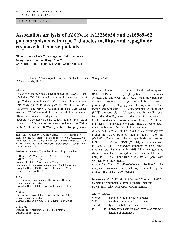摘要
Genome-wide association studies (GWASs) identified that SLC30A8 genetic polymorphism was a risk of type 2 diabetes mellitus (T2DM) in several populations. This study aimed to investigate whether the SLC30A8 rs13266634 and rs16889462 polymorphisms were associated with T2DM susceptibility and repaglinide therapeutic efficacy in Chinese T2DM patients. @@@ We conducted a case-control study of 443 T2DM patients and 229 healthy volunteers to identify SLC30A8 rs13266634 and rs16889462 genotypes by polymerase chain reaction-restriction fragment length polymorphism (PCR-RFLP) assay. Forty-eight patients were randomly selected and underwent an 8-week repaglinide treatment (3 mg/d). Fasting plasma glucose (FPG), postprandial plasma glucose (PPG), glycated hemoglobin (HbAlc), fasting serum insulin (FINS), postprandial serum insulin (PINS), homeostasis model assessment for insulin resistance (HOMA-IR), serum triglyceride, total cholesterol (TC), low-density lipoprotein-cholesterol (LDL-c) and high-density lipoprotein-cholesterol (HDL-c) were determined before and after repaglinide treatment. @@@ SLC30A8 rs13266634 risk C allele frequency was higher in T2DM patients than in healthy controls (P < 0.05). There was a better repaglinide response on FINS (P < 0.05) and PINS (P < 0.01) in patients with rs13266634 CT+TT genotypes compared with CC genotype carriers. Patients with rs16889462 GA genotype showed an enhanced repaglinide efficacy on FPG (P < 0.01), PPG (P < 0.01) and HbAlc (P < 0.05) compared with GG genotype individuals. @@@ SLC30A8 rs13266634 and rs16889462 polymorphisms were associated with repaglinide therapeutic efficacy in Chinese T2DM patients.
- 出版日期2010-12
- 单位中南大学
